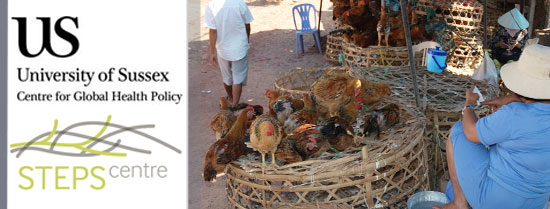
How can a better understanding of the social, political, institutional and policy dimensions of pandemic control and preparedness planning help us deal with new outbreak controversies, such as the new H7N9 avian flu in China?
Useful resources about pandemic influenza, including material from the STEPS Centre and Sussex University Centre for Global Health Policy’s recent Pandemic Flu Controversies workshop which discussed lessons, policy implications and future challenges of pandemic flu.
Key resources
- Blog: Pandemic Flu Controversies Pandemic Flu Controversies: What Have We Learned? Ian Scoones, Melissa Leach and Stefan Elbe blog for the Huffington Post
- Briefing: Zoonoses: From panic to planning
- Resources: Pandemic Influenza
- Book: Avian Influenza: Science, Policy and Processes, edited by Ian Scoones
- Book: Epidemics: Science, governance and social justice edited by Sarah Dry and Melissa Leach
- Press release: Pandemic Controversies: the global response to pandemic influenza must change
- Report: Pandemic Flu Controversies workshop report (pdf 115kb)
- Resources: STEPS Centre work on zoonoses
Pandemic Influenza pages
Our work is organised around a number of themes. Over the last decade, our work on pandemic influenza has produced a number of published resources, including books, journals, blogs and media pieces.
Video interviews
We interviewed participants at the Pandemic Flu Controversies workshop on what they thought recent controversies could tell us about how to respond to pandemic flu in the future.
Photo gallery
A selection of photos from the workshop.
Context and issues
Since the first human deaths from H5N1 were recorded in Hong Kong in 1997, avian influenza has spread across the world, concentrating in South East Asia. Billions of dollars have been spent on control measures, contingency plans and policy measures. In 2009 another influenza virus, H1N1 (popularly named ‘swine’ flu), was recorded in Mexico, and spread in pandemic proportions over the coming months.
None of these events to date have resulted in major human mortality on the scale some have predicted. The virus was either virulent but did not spread, or spread but was mild. Yet the prospect of some future combination where pandemic spread and mass deaths occur is very real, as recent laboratory research on H5N1 confirms.
Scientific advances in our understanding of the genetics, epidemiology and ecology of flu viruses have been rapid and impressive. Yet flu pandemics have generated multiple controversies, around threat perception, modelling, spending and response measures – raising questions about whose knowledge counts, and who gains and who loses. How can a better understanding of the social, political, institutional and policy dimensions of pandemic control and preparedness planning help us deal with such controversies? What lessons can we learn from recent controversies, and for the future?
Research at the STEPS Centre and the Centre for Global Health Policy at the University of Sussex interrogates these questions through on-going work in a number of settings. Collaborations with natural scientists, policymakers and field practitioners bring new insights to bear on pressing policy issues at the centre of the global response to pandemic influenza. A ‘One Health’ approach is at the core of our work, with an emphasis on cross-disciplinary and inter-sectoral engagement, with our work in particular bringing perspectives from the social and political sciences, which are often missing from global policy discussions.
- Workshop programme (pdf)
- Participants list (pdf 132kb)